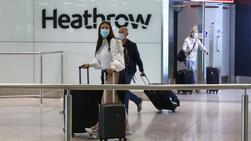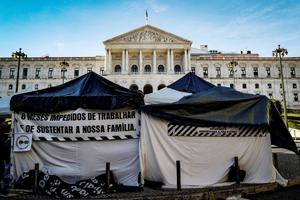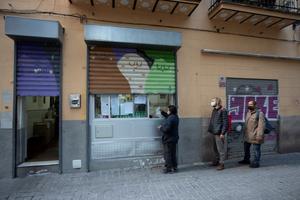 Passengers, wearing protective face masks, walk through the international arrivals hall after arriving at Terminal 2 at London Heathrow Airport in London, UK, on Monday, June 8, 2020. (PHOTO / BLOOMBERG)
Passengers, wearing protective face masks, walk through the international arrivals hall after arriving at Terminal 2 at London Heathrow Airport in London, UK, on Monday, June 8, 2020. (PHOTO / BLOOMBERG)
WASHINGTON / SANTIAGO / QUITO / BRASILIA / BUENOS AIRES /ROME / RIGA / ADDIS ABABA/ MADRID / NAIROBI / BERLIN / COPENHAGEN - The UK is shortening the self-isolation window for people exposed to the coronavirus to 10 days from 14, saying a review of the evidence justifies easing the restriction.
The change takes effect on Monday in England, Scotland and Northern Ireland, and it’s already the policy in Wales. People who test positive should self-isolate for 10 days from the start of symptoms, or from the date of their test if they’re asymptomatic, and the countdown starts for close contacts the day after exposure.
People returning from countries that aren’t part of the corridor for quarantine-free travel should likewise self-isolate for 10 days instead of 14, according to a joint statement from chief medical officers of the four regions.
“We are now confident that we can reduce the number of days that contacts self-isolate,” the officials said. “We urge everyone to self-isolate when appropriate; it will save lives.”
Advocates of reducing self-isolation periods argue that doing so will increase compliance. Only about 20 percent of people with COVID-19 symptoms in the UK were properly isolating at home over the summer, a government advisory panel said earlier.
The UK change will also apply to anyone who began self-isolating before Monday. The NHS Test and Trace service will update its guidance at that point and the passenger locator will also change. The NHS COVID-19 app won’t reflect the shift until Thursday, so anyone who gets a notification saying they need to isolate can stop doing so when the countdown timer hits three days, the statement said.
Meanwhile, London Mayor Sadiq Khan beefed up the policing of COVID rules and announced more community testing in the capital in an effort to avoid having the city placed under the UK’s toughest virus restrictions.
Some 85 new test centers will be rolled out across the capital, including 45 mobile units, Khan’s office said in a statement. They’re additional to plans announced Thursday by Health Secretary Matt Hancock to mass test secondary school pupils and their families in parts of London and the neighboring counties of Kent and Essex.
The new measures come after fresh data showed the UK capital has the highest rate of cases in England, putting the capital on course to move up to Tier 3, the toughest of the government’s three layers of restrictions. That would see all pubs, bars, restaurants and indoor entertainment venues closed. Khan warned in his statement of a “long winter ahead of us.”
Another 20,964 people in Britain have tested positive for COVID-19, bringing the total number of coronavirus cases in the country to 1,787,783, according to official figures released Thursday.
The coronavirus-related deaths in Britain rose by 516 to 63,082, the data showed.
AstraZeneca
AstraZeneca will start clinical trials to test a combination of its experimental COVID-19 vaccine with Russia’s Sputnik V shot aimed at boosting the efficacy of the British drugmaker’s vaccine, Russia’s sovereign wealth fund said on Friday.
Trials will start by the end of the year and Russia wants to jointly produce the new vaccine if it is proven to be effective, said the RDIF wealth fund, which has funded Sputnik V, named after the Soviet-era satellite that triggered the space race.
AstraZeneca, in a statement on Friday, said it was considering how it could assess combinations of different vaccines, and would soon begin exploring with Russia’s Gamaleya Institute, which developed Sputnik V, whether two common cold virus-based vaccines could be successfully combined.
It did not give further details. However, its Russian arm said it would start to enrol adults aged 18 years and older to the trial.
The co-operation between one of Britain’s most valuable listed companies and the state-backed Russian science research institute highlights the pressure to develop an effective shot to fight the pandemic that has killed over 1.5 million people.
The move is likely to be seen in Moscow as a long-awaited vote of confidence by a Western manufacturer in Sputnik V.
Its Russian developers say clinical trials, still underway, have shown it has an efficacy rate of over 90 percent, higher than AstraZeneca’s own vaccine and similar to US rivals Pfizer and Moderna.
Germany
Germany’s daily coronavirus cases and deaths rose the most since the pandemic began, increasing pressure on authorities to impose a hard lockdown over the holiday season.
New coronavirus-related fatalities climbed by 604 in the 24 hours through Friday morning, while cases jumped by another 32,734, according to data from Johns Hopkins University. Both figures exceeded previous highs reached in recent weeks.
“The wave needs to be really stopped now, because it’s not going to pass by anyone,” Manuela Schwesig, the state premier of Mecklenburg-Western Pomerania, said on ARD television. Authorities “must” adopt tougher measures when they meet in the coming days, she said, calling for strict restrictions to start on the weekend of Dec. 19 to avoid a panic at stores.
Chancellor Angela Merkel and the heads of Germany’s 16 states are expected to discuss the pandemic at a meeting on Sunday, according to local media reports. The main measures under consideration are the closure of non-essential shops plus longer school holidays.
Germany closed bars, gyms and cinemas in early November, while allowing schools and other businesses to continue operating. The partial shutdown -- softer than curbs imposed in countries like the UK and France -- has so far failed to slow the spread of the disease.
“There’s pressure to act,” Economy Minister Peter Altmaier said Friday in an online news conference. “We’re at the point where we’re expanding lockdown measures” similar to the stricter curbs in the spring, which closed schools and most businesses.
Merkel and public health officials have warned in recent days that hospitals could become overburdened and have called for tougher measures over the Christmas and New Year period. The disease is spreading rapidly among elderly Germans, and the chancellor made an emotional appeal this week to rein in celebrations to protect friends and family.
Germany’s current contagion rate is at a record of 156 infections per 100,000 people over the past seven days, more than three times the government’s target rate. Around 83 percent of all intensive care beds are occupied, and the number of severe COVID-19 patients has been at record levels for weeks.
Sanofi and GSK
Sanofi and GlaxoSmithKline Plc, two of the world’s biggest vaccine makers, delayed advanced trials of their experimental COVID-19 shot after it failed to produce a strong enough response in older people, pushing its potential availability to the end of next year.
The partners will begin a new second-phase study with a more concentrated antigen in February after they said the current dosage failed to generate a good immune response in people 50 years and older. Younger adults showed a response similar to patients who have recovered from the disease.
The delay underscores the difficulties and uncertainties companies face in developing shots against a disease that’s already claimed more than 1.5 million lives. It’s also a blow for governments that were counting on supplies from the two vaccine giants amid expectations the world will need multiple inoculations to stop the spread of the pathogen.
In another setback for vaccine developers, Australia canceled an order for 51 million doses of a COVID-19 shot being developed by CSL Ltd and the University of Queensland. A component of the vaccine comes from the human immunodeficiency virus, and while that posed no risk of infection, some trial participants had false positive tests for HIV.
Africa
African governments should embark on proactive engagement with local communities to boost uptake of COVID-19 vaccine once they are deployed in the continent, a senior World Health Organization (WHO) official said on Thursday.
Matshidiso Moeti, WHO Regional director for Africa, said that involving communities at every stage of the vaccine's roll-out will help dispel misinformation that could undermine inoculation of high-risk groups.
Matshidiso Moeti, WHO Regional director for Africa, said that involving communities at every stage of the vaccine's roll-out will help dispel misinformation that could undermine inoculation of high-risk groups
"The success of any immunization campaign hinges on communities' trust and acceptance," Moeti said in a statement issued in Nairobi.
"It is vital that we equip them with the right information, allay any fears and address concerns," she added.
A ten-point vaccine readiness tool for 47 countries in the WHO African Region found that efforts to boost community engagement stood at only 12 percent as opposed to the 80 percent threshold.
ALSO READ: ECB launches fresh stimulus to boost virus-hit economy
The assessment tool found that community involvement ahead of COVID-19 vaccine launch was given lethargic attention yet it was critical to boost its acceptance in the sub-Saharan African region.
"Vaccines are our best hope of ending this pandemic. While all the efforts being made for successful immunization campaigns are critical, without community support they can easily flounder," said Moeti.
She said that strategic engagement with communities will help them gain better understanding of COVID-19 vaccine, its safety, efficacy and possible side effects.
According to Moeti, WHO is encouraging African countries to strengthen surveillance, regulation, training and monitoring systems in order to ensure the roll-out of the vaccine is devoid of glitches.
 A teacher gives lesson in a classroom of Albert Street Primary School, in Johannesburg CBD, South Africa on November 25, 2020. The school was created 12 years ago to provide basic education to the children of asylum seekers and refugees. Due the economic consequences of the COVID-19 coronavirus pandemic, the number of students hosted in the school decreased from 168 to 50, creating a drastic reduction of staff. The lack of basic services as electricity is also a challenge. (LUCA SOLA / AFP)
A teacher gives lesson in a classroom of Albert Street Primary School, in Johannesburg CBD, South Africa on November 25, 2020. The school was created 12 years ago to provide basic education to the children of asylum seekers and refugees. Due the economic consequences of the COVID-19 coronavirus pandemic, the number of students hosted in the school decreased from 168 to 50, creating a drastic reduction of staff. The lack of basic services as electricity is also a challenge. (LUCA SOLA / AFP)
Richard Mihigo, coordinator of the WHO Immunization and Vaccine Development Program, said that multilateral institutions have partnered with governments and industry to promote access to COVID-19 vaccine in Africa.
"We have started working with African countries to prepare for logistics, infrastructure and adequate financing in order to ensure the vaccine is easily available to priority groups like healthcare workers," said Mihigo.
The number of confirmed COVID-19 cases in the African continent reached 2,304,485 with a death toll of 54,856 as of Thursday afternoon, the Africa Centers for Disease Control and Prevention (Africa CDC) said
He said that grassroots-based advocacy is key to ensure that African communities have confidence in COVID-19 vaccine ahead of its roll-out expected next year.
ALSO READ: UK warns people with serious allergies to avoid Pfizer vaccine
The number of confirmed COVID-19 cases in the African continent reached 2,304,485 with a death toll of 54,856 as of Thursday afternoon, the Africa Centers for Disease Control and Prevention (Africa CDC) said.
A total of 1,968,447 people infected with COVID-19 have recovered across the continent so far, according to the continental disease control and prevention agency.
The most COVID-19 affected African countries in terms of the number of positive cases include South Africa, Morocco, Egypt, and Ethiopia, figures from the Africa CDC showed.
The southern Africa region is the most COVID-19 affected region both in terms of the number of confirmed positive cases as well as the number of deaths. The northern Africa region is the second most COVID-19-affected African region, it was noted.
Argentina
Argentine President Alberto Fernandez on Thursday announced his administration signed an agreement with Russia to receive the Sputnik V vaccine against the novel coronavirus disease (COVID-19).
"Yesterday (Wednesday) we signed the contract with the Sovereign Fund of the Russian Federation that guarantees the provision of Russian vaccines for Argentina," the president told the press at the presidential headquarters in Buenos Aires.
The country will be able to count on "sufficient doses to be able to vaccinate 10 million Argentines between January and February," Fernandez added.
The president called on the public to continue taking preventive measures, saying "the vaccine has not solved the pandemic and we must pay special attention to what is happening in neighboring countries and in Europe. We have not solved the problem because the risk continues to grow."
Argentina registered its first case of COVID-19 on March 3 and reported 1,475,222 infections and 40,222 deaths as of Wednesday.
Brazil
Brazil's Health Regulatory Agency (Anvisa) on Thursday granted temporary authorization for the emergency use of vaccines against the novel coronavirus disease (COVID-19).
In announcing the decision, the director of the agency, Alessandra Bastos Soares, said emergency authorization aims to speed up a nationwide immunization campaign.
 Volunteer Fatima Sanson, dressed up as Mrs Claus, embraces a needy child in Belo Horizonte, Minas Gerais state, Brazil on December 7, 2020. (DOUGLAS MAGNO / AFP)
Volunteer Fatima Sanson, dressed up as Mrs Claus, embraces a needy child in Belo Horizonte, Minas Gerais state, Brazil on December 7, 2020. (DOUGLAS MAGNO / AFP)
"The authorization of emergency use is a mechanism that can facilitate the availability and use of vaccines against COVID-19, even if they have not been evaluated under the registration screening, as long as they meet the minimum requirements of safety, quality and efficacy," she said.
Brazil has the world's second-highest COVID-19 death toll, after the United States, and the third-largest outbreak, after the United States and India.
As of Wednesday, the country registered 6,728,452 cases of COVID-19 and 178,995 deaths from the disease.
Chile
Chile's Metropolitan Region, which includes the capital Santiago, is in a "critical" situation following a recent spike in daily cases of the novel coronavirus disease (COVID-19), Minister of Health Enrique Paris said Thursday.
"Today the data show us that the Metropolitan Region is at a critical level and is growing at a level that we have not seen for a long time. Decisions must be taken now to stop the spread of the virus," the minister said at a press conference.
The Metropolitan Region is one of the 16 regions Chile is divided into, and its capital is the nation's capital, Santiago.
"There is a progressive increase in the weekly cases observed in the Metropolitan Region, which increased 53 percent between Nov 14 and Dec 10," said Paris.
The Ministry of Health reported 1,662 new daily cases, bringing the accumulated caseload to 566,440, and 84 deaths in the last day, raising the death toll to 15,774.
Denmark
Denmark registered 3,132 new COVID-19 cases over the past day, bringing its nationwide tally to 100,489, the health authority reported on Thursday.
The country also recorded 14 new deaths from the virus, taking its total COVID-19 death toll to 918, said the Danish Health Authority, citing data from the Statens Serum Institut.
The past day also saw seven people discharged from hospital and 1,297 recoveries across the nation, it said.
Ecuador
Ecuador on Thursday said it has registered 200,379 confirmed cases of the novel coronavirus disease (COVID-19), with tests detecting 1,151 new cases in the past 24 hours.
According to the Ministry of Public Health, the South American country also registered 25 more fatalities from the disease, raising the death toll to 9,320, since the country's first case was reported on Feb 29.
Ecuador is still experiencing a first wave of infections with community transmission of the virus, said health officials.
The majority of cases have been in the capital Quito, where 66,028 people have tested positive for the coronavirus, including 516 in the last 24 hours.
In an interview Thursday with public television "Ecuador TV," head of Quito Health Secretariat, Ximena Abarca, said there has been an increase in COVID-19 hospitalizations, and called on residents to take preventive measures.
"People protecting themselves is the best way to tackle the virus," said Abarca.
Ethiopia
The Ethiopian Ministry of Health on Thursday said the country's total number of confirmed COVID-19 cases hit 115,360, after 526 new cases were reported.
According to the ministry, the new cases were discovered out of 5,741 COVID-19 medical tests that were conducted in the east African country during the last 24 hours.
Ethiopia has conducted 1,689,299 COVID-19 medical tests so far, it was noted.
The ministry also disclosed that the number of COVID-19 related deaths in the country reached 1,779 as of Thursday, after 10 new COVID-19 related deaths were reported during the last 24-hour period.
The ministry said that some 88,975 patients who tested positive for COVID-19 had recovered so far, including 1,731 in the last 24-hour period.
Ethiopia's capital Addis Ababa is currently the epicenter of the COVID-19 pandemic, reporting more than 50 percent of all confirmed COVID-19 cases in the country, according to the ministry.
France
As the downward trend in daily COVID-19 infections has been flattening, museums, cinemas and theaters in France would remain closed for three more weeks with a night-time movement ban to be introduced to abort a potential third wave, Prime Minister Jean Castex announced on Thursday.
"We are not yet at the end of this second wave," Castex warned. "We cannot let down our guard. We have to stay focused and find our way through the next few weeks with lots of vigilance."
Castex admitted that the target of 5,000 new cases of infection per day, set by President Emmanuel Macron to further relax the lockdown, would be out of reach, forcing authorities to maintain some restrictions.
Next Tuesday, "we will move to a new stage but the rules will be stricter than what we had initially envisaged," he told a press meeting.
Cinemas, theaters, performance halls, museums, circuses, zoos and casinos would not open their doors on Dec 15 as planned because "the conditions set for their reopening are unfortunately not met."
Starting from next week, a curfew would run from 8 pm to 6 am -- an hour earlier than planned, and "will be strictly controlled," said the prime minister.
The night-time movement ban would be lifted on Dec 24 but it would not be the case for New Year's Eve.
Meanwhile, France would go ahead with the de-confinement plan next week. The lockdown permission slips would be scrapped, allowing people to move freely and travel without restriction in the daytime, Castex added.
On Thursday, France reported 13,750 new COVID-19 cases, down from 14,595 registered a day before, while the deaths increased by 292 in one day.
Since the epidemic outbreak, over 2.3 million people have tested positive, of whom 56,940 have died.
ALSO READ: German COVID-19 deaths rise the most since start of pandemic
Italy
Italy recorded 16,999 new COVID-19 cases over the last 24 hours, confirming a downward trend in infections seen since late November, the Health Ministry said on Thursday.
On the same day, the total number of people who have recovered since the outbreak of the pandemic in late February exceeded one million. Another 30,099 recoveries were recorded on a daily basis, pushing the total to 1,027,994.
 A face masked woman sits on empty Spanish Steps in downtown Rome on December 5, 2020, during the government's restriction measures to curb the spread of the COVID-19 pandemic caused by the novel coronavirus. (FILIPPO MONTEFORTE / AFP)
A face masked woman sits on empty Spanish Steps in downtown Rome on December 5, 2020, during the government's restriction measures to curb the spread of the COVID-19 pandemic caused by the novel coronavirus. (FILIPPO MONTEFORTE / AFP)
Thursday also saw 887 new fatalities, which brought the country's death toll to 62,626.
Official statistics showed active infections dropped by 13,988 compared to Wednesday, bringing total active cases to 696,527.
Overall, Italy's number of assessed COVID-19 cases reached 1,787,147.
The latest data confirmed a flattening in the curve of the second wave here, suggesting the comprehensive package of rules implemented since early November -- and based on a three-tier system defining a different level of alert and of restrictions for each region -- was delivering results.
Latvia
A state of emergency was declared in the Latvian health system on Thursday as hospitals were struggling to cope with the high number of incoming COVID-19 patients, Health Ministry official Daina Murmane-Umbrasko said at a news conference.
The decision to declare the emergency was taken not by the government but a panel of health experts and heads of Latvia's hospitals, the State Operative Medical Commission, in order to expand the powers of hospital administrations, authorizing them to reorganize the medical institutions so that they can take in more patients.
The state of emergency in the health sector means that medical institutions will have more freedom in managing their resources. Hospital staff that normally do not handle infectious disease patients can now be involved in treating COVID-19 patients and medical workers on vacation can be recalled to stand in for colleagues who are sick or in quarantine.
Under the emergency rules, lower-level hospitals can be ordered to take over patients from the larger university and regional hospitals so that they can set aside more beds for severe COVID-19 patients.
According to the latest data, the saturation level of COVID-19 beds in Latvia's hospitals averaged at 76 percent on Thursday, but in the two leading hospitals, Riga Eastern Clinical University Hospital and Pauls Stradins Clinical University Hospital, 90 percent of COVID-19 beds were filled already.
According to the Latvian Center for Disease Prevention and Control (CDC), there are more than 700 COVID-19 patients who are currently receiving treatment in hospitals. Earlier, Health Minister Ilze Vinkele warned that the Latvian health system's maximum capacity would be up to 1,000 COVID-19 beds.
Mexico
Mexico reported on Thursday 11,897 new COVID-19 cases, bringing the national total to 1,217,126, according to its health ministry.
Meanwhile, the country's death toll from the virus increased by 671 to 112,326.
Mexico now ranks fourth among Latin American countries in terms of documented COVID-19 cases, following Brazil, Argentina and Colombia.
Nigeria
Nigeria expects to license by April one of the vaccines under development globally for COVID-19, the West African nation’s drugs regulator said.
“We are looking at the end of the first quarter of next year or the beginning of the second quarter” to approve a shot for use in Nigeria, National Agency for Food and Drug Administration and Control Director-General Mojisola Adeyeye said in an interview on Wednesday.
Africa’s most-populous country also expects to benefit from the World Health Organization-backed Covax initiative, which is working to improve access to vaccines for 92 low- and medium-income countries, Adeyeye said. The Covax partnership is also operating on a similar timeline for licensing its first coronavirus vaccine, she said.
While Nigeria has recorded only 71,000 cases of COVID-19 and fewer than 1,200 deaths from the illness, cases of the disease have been climbing again this month, with 550 cases registered on Dec 8. However, testing rates have been low with about 810,000 performed in a country with a population of more than 200 million.
“The Covax facility will supply vaccines for 20 percent of the population,” said Adeyeye. “Nigeria will need to procure theirs from whichever company they want or whichever company NAFDAC certifies” to meet the needs of the rest of the population.
Portugal
The number of COVID-19 deaths in Portugal almost doubled during the second wave of the pandemic compared with the first, according to a survey carried by the Portuguese newspaper Publico on Thursday.
 Banners reading "Eight months prevented from working and providing sustenance for our families. Surviving on Bread and Water movement" are deployed on several tents in front of the Portuguese Parliament where a group of nine catering business owners are on a hunger strike as part of a protest to demand a meeting with the government in search of measures to help the catering sector amid the coronavirus crisis, in Lisbon on December 3, 2020. (CARLOS COSTA / AFP)
Banners reading "Eight months prevented from working and providing sustenance for our families. Surviving on Bread and Water movement" are deployed on several tents in front of the Portuguese Parliament where a group of nine catering business owners are on a hunger strike as part of a protest to demand a meeting with the government in search of measures to help the catering sector amid the coronavirus crisis, in Lisbon on December 3, 2020. (CARLOS COSTA / AFP)
In the first five months of the pandemic, Portugal recorded 1,735 deaths linked to the new coronavirus, while the number of fatalities rose to 3,229 between the beginning of August and December.
According to Vasco Ricoca Peixoto, a researcher at the National School of Public Health in Portugal, this increase in deaths during the second wave in Portugal occurred because "the number of infections is higher, reaching more people in the older age groups, who are at higher risk."
The specialist also pointed out that the "initial fear" and the lack of knowledge about the severity of the disease had led people to respect the confinement measures more during the first wave.
This Wednesday saw the extension of the state of emergency in Portugal, which will remain in effect until Dec 23. The country registered another 70 deaths and 4,097 positive COVID-19 cases on Wednesday, bringing the number of fatalities to 5,192 and that of the confirmed infections to 332,073 since the beginning of the pandemic.
Francisco Ramos, the coordinator of the country's vaccination taskforce, announced on Thursday that Portugal will vaccinate 50,000 people a day in health centers starting in January 2021.
According to the website of the World Health Organization, as of Dec. 8, there were 214 COVID-19 candidate vaccines being developed worldwide, and 52 of them were in clinical trials.
Russia
Russia’s death toll related to COVID-19 hit a record of 22,571 in October, more than 80 percent above the previous peak seen in May, the State Statistics Service said, as the disease spreads widely across the country.
The data, released Thursday and based on death certificates, are considered more accurate than the daily figures reported by the government’s virus-response office. Those put the October total at 7,344. Officials blame reporting issues for the difference and reject charges that they’re deliberately underreporting the death toll.
Russia has the fourth-largest number of cases of the disease in the world, but Deputy Prime Minister Tatyana Golikova said this week that its death rate is lower than those in many other countries.
The latest data put the total death toll at 78,623 between April and October, more than double the virus-response office’s figure of 28,220 for that period. Those figures include only deaths attributed to COVID-19, while the State Statistics Service data also include cases where the disease was detected but not reported among primary causes of death.
The agency revised upward its count of deaths linked to COVID-19 in September to 10,179.
COVID-19 was the largest contributor to the 151,191 increase in deaths so far this year from 2019, bringing the total to 1.66 million, according to the statistics agency. That’s the highest level since at least 2011.
Russia began administering its COVID-19 vaccine to health workers and other key groups this week.
Spain
Spain's health minister sent an optimistic message Thursday for the country's fight against COVID-19, saying Spain is starting to "glimpse hope."
Spain is "turning the curve of infection for the second time and the first vaccines will arrive very soon," Salvador Illa, the health minister, said in front of the health commission of the Spanish Congress, the lower Chamber of the Parliament. "We are beginning to glimpse hope on the horizon."
 People queue to receive food aid at the Zaqueo Association in Palma de Mallorca, Spain on December 2, 2020. (JAIME REINA / AFP)
People queue to receive food aid at the Zaqueo Association in Palma de Mallorca, Spain on December 2, 2020. (JAIME REINA / AFP)
The minister's remarks came one day after his ministry confirmed that the incidence of new coronavirus cases recorded over the past 14 days had fallen below 200 per 100,000 inhabitants for the first time since August.
The incidence of COVID-19 cases now stood at 193 cases per 100,000 people, while the country's confirmed infections now totaled 1,712,101 and death toll reached 47,019.
However, he warned that the forthcoming Christmas holidays, during which people will be allowed to visit family members under gathering limits, could have a negative effect on infection rates.
"We have just had a long weekend, we are at the gates of the Christmas holidays and winter, we cannot drop our guard now and we have to continue with the current safety measures," he said.
"Taking care of ourselves is the best gift this Christmas," stressed Illa.
The minister also gave an upbeat message about the rollout of the vaccination program in Spain, saying "the first authorized vaccines will arrive in our country in less than a month, which will be a first step towards the long-awaited normalcy."
"Vaccination will require a few months, until the summer, to cover enough people to allow us to relax restrictions, so the current protection measures will continue to be vital," he said.
Illa said he understood "the doubts" many people have over the new vaccines, but insisted that "vaccines save lives and protect us against many diseases. Thanks to vaccines, for example, smallpox has been eradicated since 1980."
US
An advisory group of the US Food and Drug Administration (FDA) met on Thursday and recommended the agency issue emergency use authorization (EUA) to the COVID-19 vaccine of American drugmaker Pfizer in partnership with German company BioNTech.
The FDA's Vaccines and Related Biological Products Advisory Committee, made up of independent scientific and public health experts from around the country, met to discuss the first EUA request for the vaccine candidate, submitted by Pfizer and BioNTech.
If the vaccine is authorized by the FDA, the first shots could be distributed in the country within days, according to media reports. Health care workers and nursing home residents would be among the first in line.
ALSO READ: US still short of virus protection
The United States has reported more than 231,000 new COVID-19 cases and over 3,000 deaths in a single day on Wednesday, a gloomy new milestone since the pandemic hit the country.
Belarus
Belarus reported 1,967 new COVID-19 cases on Friday, the highest number of daily infections to date, taking its nationwide tally to 156,359, according to the country's health ministry.
A total of 1,845 patients recovered in the last 24 hours, bringing the total to 133,930, the ministry added.
So far, 1,246 COVID-19 patients have died since the outbreak of the pandemic in the country, including eight over the past 24 hours, it said.
As of Friday, 3,548,306 tests for the virus have been conducted across the country, including 31,290 over the past 24 hours, according to official figures.
Namibia
Namibia recorded a total of 324 COVID-19 positive cases on Friday, the highest number of confirmed cases reported within 24 hours since the COVID-19 outbreak started in the country.
Namibia's Minister of Health Kalumbi Shangula in a daily update said 223 of these cases are from Windhoek district, which accounts for 69 percent of the total number of confirmed cases.
"We are observing an increasing trend in the number of cases coming from various regions across the country, with particular concern for Erongo and Otjozondjupa whose numbers are almost double the number reported yesterday," he added.
According to Shangula, Namibia has never before recorded such a big number of new COVID-19 positive cases in a period of 24 hours since the beginning of the pandemic.
Estonia
Estonia's Health Board on Friday reported 358 new COVID-19 cases within the last 24 hours, bringing its total caseload to 16,956.
As of Friday morning, the disease has claimed 42 lives in Estonia, it added.
In order to stop the spread of the virus, the Health Board has requested cancelling all large-scale parties and urged the Estonian people not to travel abroad during the winter holidays.
Slovakia
Slovakia on Friday reported 2,166 new COVID-19 cases and 18 more deaths, according to the latest official data from the government website.
The national caseload has reached 127,087 with 1,122 deaths, and a total of 93,533 patients have recovered, said the statistics.
Over 1 million tests for COVID-19 have been conducted, according to official figures.


